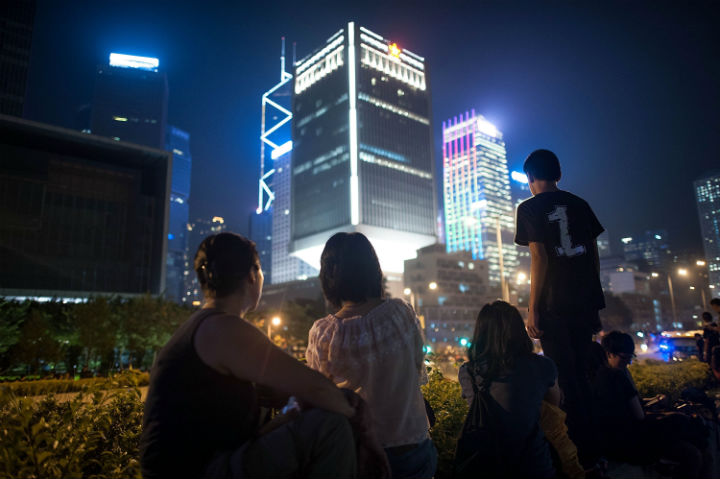The Canadian government has expressed “concern” at the tensions between Chinese authorities and the swelling crowd of pro-democracy protesters in Hong Kong, but has held off saying anything that may further encourage the demonstrators.

READ MORE: Hong Kong protests: Calm before the storm
The situation has been tense since police tried to crack down on protesters on Sunday.
Protesters took to the streets of Hong Kong’s Central business district to demand China allow full democratization in the city — which returned from British to Chinese rule in 1997 and has been a Special Administrative Region under the One Country, Two Systems policy.
The Chinese government plans to only allow approved candidates to run for the post of Hong Kong’s chief executive in an election set for 2017, which many residents deem unfair.
READ MORE: Canadian captures scenes of ‘peaceful’ protests in Hong Kong
The protesters are demanding the resignation of current Hong Kong Chief Executive CY Leung, who said in 2013 there would be open elections by 2017, and threatened to take over government buildings if he didn’t quit. (As of publication, that had not happened)
Leung said he will not resign, but early Friday appointed chief secretary Carrie Lam to hold talks with the Occupy Central protesters.
He also asserted that there will be consequences should the protesters act on their threats to storm government buildings.
WATCH: Hong Kong’s Chief Executive refuses to resign in face of protesters demands
READ MORE: Security firm says Hong Kong protestors being spied on with smartphone apps

Get daily National news
Adam Hodge, Foreign Affairs Minister John Baird’s press secretary, expressed the government’s “concern for the worsening tensions in Hong Kong” this week and its support for Hong Kong residents’ hopes for universal suffrage.
“Canada stands with the democratic aspirations of the Hong Kong people,” Hodge said in an email to Global News on Wednesday. “The rule of law and the good governance of Hong Kong are truly valued by Canada.
“We reiterate our support for the implementation of universal suffrage for the election of the Chief Executive in 2017 and all members of the Legislative Council in 2020.”
But, when asked if Canada has discussed its concern with Chinese government counterparts or expressed that support for the implementation of greater democratization, Hodge offered a vague response.
“Canada has a mature and frank dialogue with the Chinese on a variety of issues,” he wrote in an email.
Compare this to Foreign Minister Baird’s response to the Iranian government’s screening candidates prior to the June 2013 presidential election.
“Iranian state media has reported that a mere eight of the 686 people who registered as presidential candidates for the upcoming election have passed the regime’s ideological vetting and been approved to stand. This absurd result further demonstrates how deeply this bankrupt regime distrusts and fears its own people—even its own supporters,” Baird said in May 2013.
But Hong Kong isn’t Iran.
- Jasper mayor says CN Rail relocation will be devastating: ‘Deeply disappointed’
- Retired Quebec teacher buys winning lottery ticket at last minute, wins $40M
- N.B. election: Higgs went to ‘very dark place’ with Liberal joke, opponent says
- GM, Volvo, Land Rover vehicles among those in big recall. What to know
“We know what is acceptable within in the Chinese system, Tiberghien explained. “You risk a backlash that will diminish what Hong Kong has had until now.” Among those liberties Hong Kong residents have is the freedom of expression and the freedom of assembly, both of which are being exercised in the current mass demonstration.
“So, we’re careful to preserve that.”
Tiberghien also explained China isn’t exactly reneging on anything: the government said it would give the Hong Kong people more say in its leadership in 2017, but didn’t promise completely open nominations.
“It’s not like China broke a promise, but within the options China had it’s a pretty tough option,” Tiberghien said. “It fits within the envelope with what was committed in 1994 and 1997.”
READ MORE: Why the umbrella became a symbol of Hong Kong’s protests
He dismissed the notion that trade is a factor in Canada’s measured reaction to the protests.
While China is Canada’s second-largest trading partner, Tiberghien explained Canada has a big stake in the situation being resolved peacefully: There are approximately 300,000 Canadian citizens living in Hong Kong.
The Chinese government, for its part, has lashed out at foreign government criticism of the situation — particularly the U.S.
“We ask that the American side speak and act cautiously, and adhere to its pledges of not interfering in China’s internal affairs, and not send out wrong signals,” the South China Morning Post reported Chinese Foreign Minister Wang Yi saying.






Comments